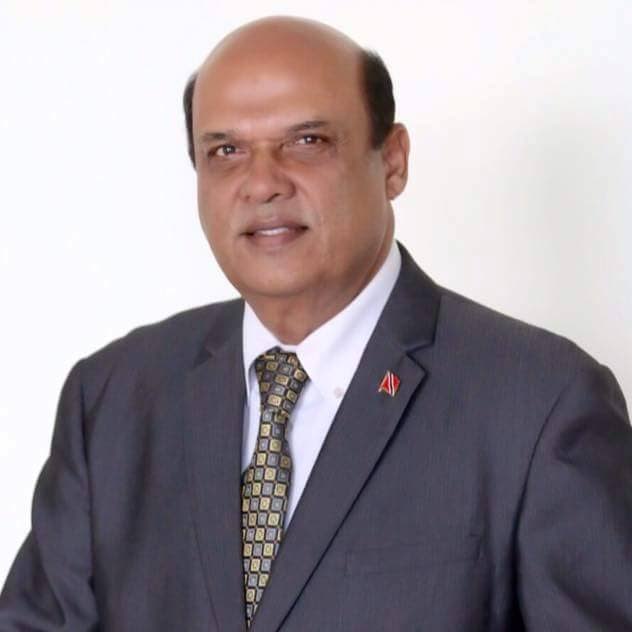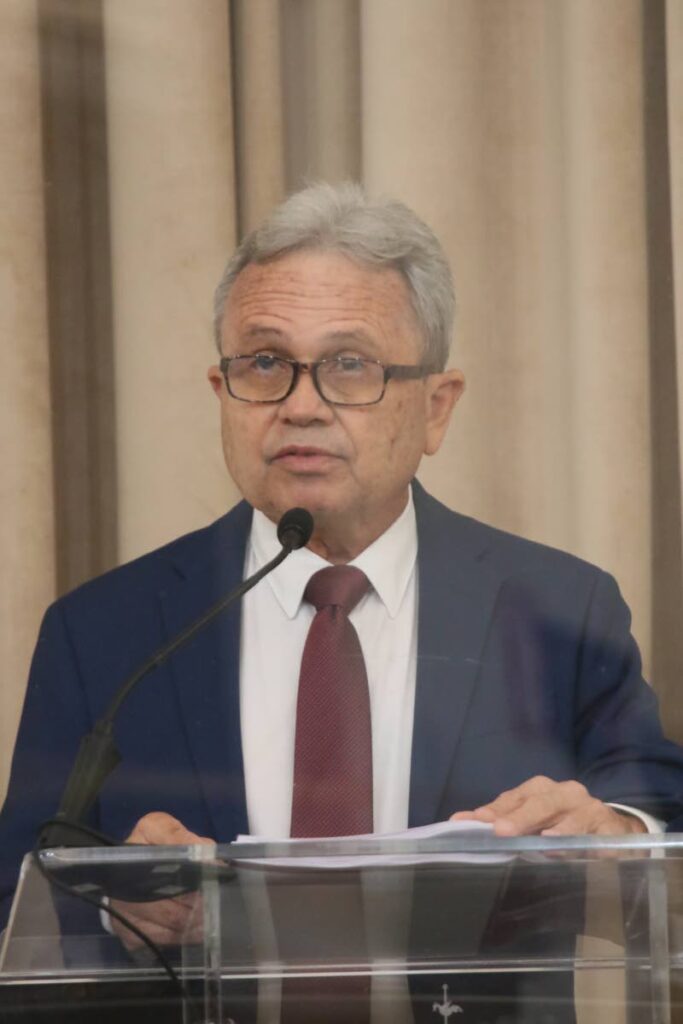Ex-minister joins call for reversal of fuel price increase

FORMER Chaguanas East MP and tertiary education minister Fazal Karim says now is the wrong time to remove the fuel subsidy. Karim made the suggestion as he joined the national conversation on Government's decision to increase fuel prices from April 19.
In a statement, Karim said the new prices represent an increase of 17, 121 and 161 per cent for premium, super and diesel between 2015 and this year.
"It is the fifth gas spike on super gasoline and diesel in the past seven years due to the removal of the fuel subsidy by the PNM Government, and an increase in premium gasoline for the first time in ten years."
Against the background of the covid19 pandemic, the Russian invasion of Ukraine on February 25, increasing food prices, increased unemployment and no increase in wages, Karim said Government's decision to increase fuel prices is ill-timed.
He was concerned that this will "heap untold hardships on citizens who are struggling to make ends meet." Karim was also worried about increasing poverty levels and a weakening of the job market in the current scenario.
"Given the factors above, it is safe to say that the fuel subsidy is necessary over the short to medium term."
Karim said the purpose of a fossil fuel subsidy is to reduce the cost of energy to a producer or consumer.
"In 1974, the Petroleum Production Levy and Subsidy Act was enacted in TT and a fuel subsidy was established to share petroleum revenues with citizens and protect consumers from high fuel prices." In response largely to climate change goals, Karim said, "Many countries have attempted to phase out and rationalise 'inefficient' fossil fuel subsidies."
But he observed, "The G20 countries continue to pump US$200-US$300 billion annually into oil and gas subsidies contrary to a commitment of subsidy reform in 2009 at the Pittsburgh Summit."
Between fiscal 2011 and 2020, fuel in TT was subsidised to the tune of $21 billion. Karim said $19 billion came under the former UNC-led People's Partnership (PP) coalition government while $2 billion came under the incumbent PNM administration
"The entire population benefited from the value of the fuel subsidy under the PP." But Karim claimed the PNM cut the fuel subsidy while wasting billions of dollars on failed plans, vanity projects and property rentals to party members. Karim disagreed with an argument for the fuel subsidy disproportionately benefits high-income groups.

"The same Government rolled back the subsidy on diesel, which increased from TT$1.50 per litre (2015) to TT$3.91 per litre (2022) making it the highest percentage spike of all three fuels.
With diesel being the fuel used most in public transportation as well as the transportation of goods and services, Karim said, "An increase in diesel is passed directly on to consumers, and hurts the poor and most vulnerable in society contrary to the Government’s rhetoric of protecting low-income groups."
Karim recalled that in 2017, Government removed motor vehicle taxes, VAT and duties on hybrid vehicles and by 2018 tax concessions on hybrid vehicles with engine sizes exceeding 1599cc were rescinded. "By October 2020, all taxes were reintroduced on hybrid and CNG vehicles, and in November 2021 the Prime Minister ironically stood before world leaders at the COP26 Summit on Climate Change and stated that his Government “…was implementing measures to phase in electric vehicles”. Karim claimed this showed Government has no plan to transition TT to low-carbon modes of transport.
On April 8, Finance Minister Colm Imbert said to encourage motorists to conserve fuel and alleviate the effect of increased fuel prices on citizens, by mid-May, arrangements will be made "to allow for the waiver of taxes and customs duty on suitably sized imported hybrid motor cars, both new and used." These concessions will not be available for owners or importers of high-end luxury hybrid cars. Imbert added that further details would be provided at a later date. Karim described this announcement as "a ploy that will apply to a very limited range of electric vehicles."
Imbert first announced the latest fuel price increase on April 8 in the House of Representatives. Before April 19, the prices per litre, for premium gasoline, super gasoline and diesel are $5.75, $4.97 and $3.41 respectively.

Those prices are now $6.75, $5.97 and $3.91 per litre, respectively. The price of liquefied petroleum gas (LPG) remains fixed at $21 for a 20lb cylinder of cooking gas for domestic customers. The Energy Ministry will examine what will be an appropriate LPG price for commercial customers. Cabinet made these decisions on April 7.
Prime Minister Dr Rowley said on Thursday if the international prices of fuel decrease, the consumer will benefit at the pumps even though the government has been pushing for the liberalising of the sale of fuels on the domestic market.
Imbert said Government has done its best to protect citizens from the full impact that increasing fuel prices would have on the cost of goods and services.
"Government is cognisant of the effect of an increase in the price of fuel on consumers, notwithstanding the fact that a fuel subsidy is a regressive measure," he told the House.
Imbert said that in October when the budget was presented it was not expected anywhere that oil prices would increase by over 60 per cent in five months. This was attributed to Russia's invasion of Ukraine on February 25.
When the 2022 budget was finalised last September, Imbert recalled that the oil price was just over US$70 per barrel. Two months later, it dropped to US$65 per barrel. The budget was pegged against a US$65 per barrel oil price and a US$3.75 per mmbtu natural gas price.
Concerns about oil prices were also influenced by climatic and global economic factors which pre-dated the Ukraine invasion, he pointed out.
Imbert said an adverse effect of low levels of oil production and high oil prices is an increase in the fuel subsidy, which must be paid out of tax-derived revenues. The price of motor fuels is affected by oil prices. LPG prices are affected by natural gas prices.
"At current commodity prices, contrary to persistent misinformation from some quarters, all of these fuels are still heavily subsidised, even as we have already reduced the levels somewhat, at an earlier time," Imbert said.
He said the highest subsidies are on LPG and kerosene, insisting that, "there remains substantial subsidy on fuels used in transportation."
In the absence of a subsidy, he said, "The retail prices of premium gasoline should vary from $6.18 per litre at an oil price of US$80 per barrel to $7.58 per litre at an oil price of US$100 per barrel."

Unsubsidised diesel prices, he said, would vary from $5.35 per litre at an oil price of US$80 per barrel to $6.58 per litre at an oil price of US$100 per barrel. To maintain fuel prices at current levels, Imbert said "requires a substantial amount of government subsidy." Imbert estimated that the money needed to subsidise the one-billion litres of fuel used annually in TT, "varies from $922m at an oil price of US$80 per barrel, to $1.94b for an oil price of US$100 per barrel."
He said Government will have to pay approximately $1.69 billion from tax revenues to maintain the fuel subsidy. "This level of subsidy is unbudgeted and unsustainable," he declared.
In subsequent tweets, Imbert rejected criticisms of the fuel price increases. In one tweet, he said, "Increases in the price of gas are never easy to absorb, but it is important to note that the price of gas in TT is the second-lowest out of 13 Caribbean countries in 2022. Imbert observed that diesel in the United States is currently $9.13 per litre compared to the current $3.41 per litre price in TT.
Former energy minister Kevin Ramnarine said it was not good enough for Imbert to compare fuel prices in TT to those in other countries, to justify increases in fuel prices. "You have to take into consideration other factors such as minimum wage and purchasing power." Ramnarine was hopeful that measures previously announced in the last budget regarding monitoring of fuel prices would be implemented at some stage.
"Ultimately, we need to move to a variable price at the pump with an upper limit cap." In his 2022 budget presentation in the House last October, Imbert said the Energy Ministry would post the market-based wholesale prices of premium gasoline, super gasoline and diesel on the first day of each month. He also said Government would set a "retail margin ceiling for each petroleum product to minimise price fluctuations and protect the end consumers of premium gasoline, super gasoline and diesel."
Former minister in the ministry of finance Vasant Bharath described the fuel price increases as heartless. "These are perilous economic times for most families in TT having endured seven years of an economy in a negative-growth tailspin, compounded by the battering of covid." UWI economist Dr Vaalmiki Arjoon described the fuel price increase as premature. He agreed with Ramnarine and Bharath that there were other factors to consider before implementing higher fuel prices. Arjoon observed that while other countries have higher fuel prices than TT does, they balance the effects of those increases through the provision of better public transportation systems, better health care and social services to their populations.





Comments
"Ex-minister joins call for reversal of fuel price increase"